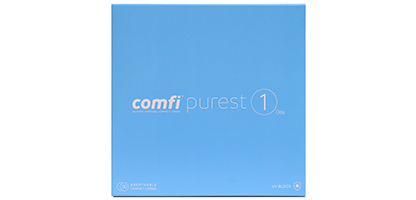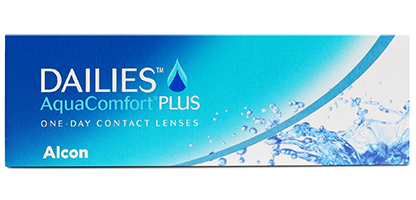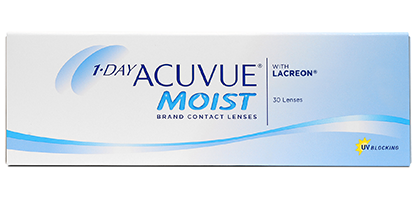Unlike glasses, contact lenses offer freedom, comfort and enhanced performance while playing sports. Whether you're a professional athlete, enjoy playing football, tennis or cricket with friends, or like to go for a run every morning, your eyesight has the potential to make or break your game plan. According to the BCLA, “Whatever your chosen sport or level, wearing the best form of vision correction can help you achieve the best possible performance and enjoyment.”
This guide explains the benefits of wearing contact lenses for sports and how they go hand in hand. Discover optician-approved tips for contact lens wearers, the best suitable lenses for sports and much more.
Contact lenses for sports
Wearing contact lenses for sports is generally safe, provided you keep your lenses clean and follow your optician's advice. Glasses, on the other hand, can slip off your face or break while playing any sports. Contact lenses are unlikely to fall out of your eyes whilst playing sports or taking part in any physical activity.
The advantages of using daily contact lenses over glasses when playing sports are evident. Running around on a pitch or court while wearing glasses can lead to several problems, such as them falling off, becoming scratched or even breaking. This is why it is recommended to wear disposable contact lenses during sports to enhance sporting performance.

Benefits of contact lenses for sports
There are many benefits of choosing contact lenses for sports, including:
A wider field of view (FOV)
You need a wide and clear field of view when playing sports, which is why you should steer clear of anything that restricts your vision. Glasses (both frames and lenses), for instance, can obstruct your view. On the contrary, contact lenses offer a wider field of view without any limitations and help you stay on your A-game.
Less susceptible to dirt
When running around a grassy field, you'll likely kick up dirt and mud along the way, which can lead to the lenses of your prescription glasses being susceptible to flying bits of dust and dirt. Glasses lenses full of smears and smudges can blur your vision and affect your performance on the pitch. In contrast, contact lenses are less prone to dirt and prove to be a much better option.
Can be worn with headgear
If the sport you're playing requires a full head helmet, such as cricket, wearing glasses can pose a problem. It's unlikely that your helmet will fit comfortably over your face with glasses on. Even if you manage to wear both, the glasses can feel uncomfortable, and in the worst-case scenario, the helmet can even snap or damage your frames. With contact lenses, you can wear your helmet hassle-free and play without distraction.
Not affected by weather conditions
Rain or shine, you may want to enjoy an outdoor run or play a sports match outdoors. In windy or rainy conditions, glasses can fog up and gather condensation on the lenses, potentially affecting your game.
Offer complete freedom
Glasses can slip off during any physical activity because of sweat and get damaged, whereas contact lenses will neither break nor slip off your face, especially when playing contact sports. Furthermore, there are no reflections when you are playing sports with contact lenses.
Beginner-friendly tips for contact lens wearers
The following tips are for individuals who will be using contact lenses for the first time for sports:
1. Wear the right contact lenses
The type of contact lenses you wear can greatly impact your performance during sporting activities. Those who lead an active lifestyle are recommended to wear soft lenses as they move less on the eye compared to hard lenses and are less likely to be dislodged. Daily disposable lenses are convenient and ideal for sports, as they can be discarded after your game is finished. If daily contact lenses are not suitable for your prescription, then soft monthly disposables or two-weekly contact lenses are also good options.
Please note that hard contact lenses, also known as rigid gas-permeable lenses, should be avoided while playing sports.
2. Avoid getting your contact lenses wet
Whether you’re playing football, rugby, golf, cricket, basketball or simply sweating out in the gym, it's important to avoid getting your lenses wet. Water contains harmful organisms that can cause serious eye infections and even lead to vision loss in serious cases.
3. Wash your hands before putting in or taking out lenses
Always wash your hands with soap and water and dry them thoroughly before inserting and removing your lenses. Do not use oily or scented soaps while washing your hands. The residue can transfer to your lenses and cause irritation to your eyes.
4. Stay hydrated
One of the key tips for contact lens wearers is to drink plenty of water and stay hydrated. Proper hydration is essential for optimal eye health. Ensure you drink enough water throughout the day, as dehydration can lead to dry eyes, which can cause discomfort while wearing lenses. Not sure whether you have dry eyes or not? Take this quiz to have a better understanding of your symptoms.
5. Don’t rub your eyes
Rubbing and touching your eyes while exercising or playing sports is a common practice. More often, you don’t even realise that you’re touching your eyes. Avoid rubbing and touching them as much as possible, as this can cause scratches on the eye or transfer bacteria to the lenses, increasing the risk of an eye infection or irritation.
Benefits of daily contact lenses for sports
Daily disposable lenses can be the most hygienic and convenient way to wear lenses for sports. They offer many benefits, such as:
- Convenience – Daily disposables are best suited for those who want to wear lenses every day or are just occasional wearers. They can be ideal for individuals who do not regularly wear lenses and need them only for specific activities, such as sports. They also eliminate the need for a cleaning and storing routine.
- Comfort – It’s important to be comfortable while playing sports so that you can focus solely on the game. Daily disposables usually feature a thinner design, making them ideal for all day wear. Also, wearing a fresh lens every time ensures a comfortable experience.
- Hydration – A fresh new pair of lenses is likely to feel more hydrating. Daily lenses can help keep your eyes feeling fresh throughout the day.
- Hygiene – Playing sports, which often involves getting sweaty and muddy fields, can increase the risk of contact lenses becoming dirty, making it difficult to keep them clean, especially if they are monthly or two-weekly. Daily disposables keep the worry of bacterial buildup at bay, as you can just wear a fresh pair every time.
Some of the bestselling daily disposables are:

 Offers
Offers Account
Account
 Favorite
Favorite
 Basket
Basket

 OFFERS
OFFERS




















